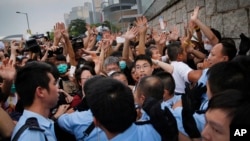As thousands of people fill the streets in Hong Kong, pro-democracy activists in neighboring Vietnam are taking notes. Anti-China sentiment runs high in the communist country, particularly when it comes to competing territorial claims in the South China Sea, but protests are usually met with swift police crackdowns.
The streets of Hanoi are free of tell-tale umbrellas, but many Vietnamese are using the Internet to show support for the pro-democracy protesters in Hong Kong.
On Facebook, profile pictures use the symbol of a dove tied with a yellow ribbon to express solidarity with the Hong Kong protests.
Activist Anh Chi’s avatar shows a photo of himself holding a card that says “Support Hong Kong civil disobedience movement” in English. He said the protest has inspired many Vietnamese advocating political change. “We learn many lessons from activists in Hong Kong, how they can call many people in the center, swap their opinions, support protesters with food and drink and other necessary things that [people] need for the long term, for many days,” he stated.
The protesters in Hong Kong have one clear goal: ensuring election candidates are not vetted by Beijing, a political reform that appeals to many Vietnam activists.
High profile protests are usually directed against China when its foreign policy is seen to infringe on Vietnamese sovereignty. These gatherings are usually broken up by police, partly because of fear they could become anti-government.
In Vietnam protests are usually spontaneous, not like the highly organized gatherings in Hong Kong, Anh Chi said, but there are similarities.
“In Hong Kong, China called the protests illegal. Vietnamese government also called our demonstrations in Hanoi or Saigon illegal too. But for us we act, make the protest according with the constitution and if they do not have a law, that is their duty, not the people’s duty,” he added.
He said he believes the government is worried about the Hong Kong protests and any attempt in Vietnam to take to the streets to show support would be stopped by the police.
But there does not appear to have been any restrictions on coverage of the rallies in Vietnam's state-run media, with national newspapers carrying on-the-scene reports from local journalists.
Speaking at a regular briefing, Vietnam Ministry of Foreign Affairs Spokesman Le Hai Binh said the protests were China’s “internal affair.”
He said Vietnam hopes Hong Kong will take appropriate measures to stabilize the situation and ensure the safety of people and property.
Vietnam analyst Jonathan London, from City University Hong Kong, visited the protests Wednesday.
“Generally the protests tend to be relaxed, festive, well maintained, extremely clean and respectful. It is mostly young adults and teenagers, but there is certainly a liberal sprinkling of older folk. At this point people are waiting for something, but that something is unknown,” he said.
London said he thinks Vietnamese people are “absolutely gripped” by the movement to stand up to mainland China.
Through news coverage and the Internet, Vietnamese have what he calls a “front row seat” to events in Hong Kong at a time when their country is engaged in a grand debate about politics and political institutions.
“While people who hold contradictory views and in particular seek to challenge authority are subject to waves of repression, nonetheless political discourse in Vietnam today is such that the explosion of a large scale social movement in Hong Kong can be discussed openly and widely, and I think that is something that is remarkable in the recent history of Vietnam,” he said.
Until there is a resolution to the stalemate between the protesters and the government in Hong Kong it is not clear what result those events will have on Vietnam’s activists, but they are sure to keep a close watch on developments.




